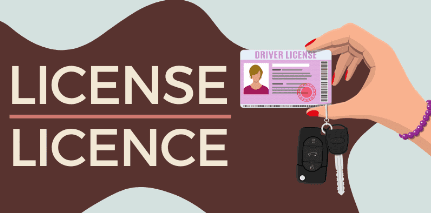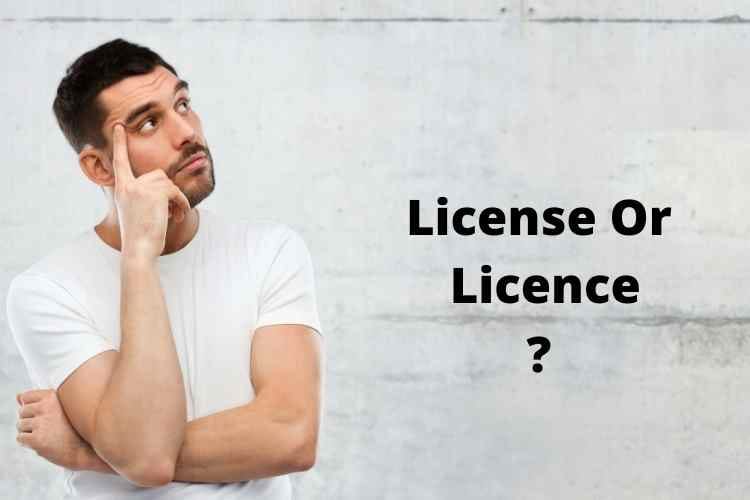Resolving the Confusion Between License and Licence: A Simple Guide
Contents

Have you ever been perplexed by the term 'license' appearing as 'licence' while reading a British novel or a Canada-based news website? Are you unsure about the correct usage in conversations or official emails? The conundrum of 'license' vs 'licence' is common among non-native English speakers in India, especially when interacting in global contexts.
Understanding and using English words correctly is crucial to sounding confident and professional, and that's exactly what we'll help you with today. In this post, we will delve into the difference between 'license' and 'licence', explore their origin and how regional variations impact their usage. We'll illustrate with examples to clarify the concept further, followed by some exercises for practice. So let's embark on this journey to conquer another hurdle in mastering the English language – the confusion surrounding 'license' vs 'licence'.
License vs Licence: Meaning, Roots and Etymology
In essence, 'licence' is used in the UK while 'license' is preferred in the US. Both variants mean essentially the same thing - permission to do something or a document that gives permission.
License vs licence in the UK in more complex in that 'license' is used as a verb that refers to the act of permitting as opposed to 'licence' which is used as a noun which refers to the permission itself. Here are some examples:
She obtained her driver's licence last week. (noun)
The state government licenses businesses to ensure they meet safety standards. (verb)
"The city council will license (verb) the new taxi company and the company will then apply for a licence (noun)to operate its fleet."
The English language is rich and varied with its roots firmly grounded in history. Here, we're exploring the origins of 'license' and 'licence':
Licence: Originating from late Middle English, this word stemmed from the Old French term ‘licence’. It's mainly used in British English today.
License: This variant took root in America during the 19th century when Noah Webster sought to simplify British spellings.
This divergence resulted from the differing linguistic evolution between American and British English. Understanding these nuances helps clarify confusion between license vs licence meaning, crucial for non-native speakers in India.
Understanding Regional Variations: License Vs Licence in Different Countries

When it comes to the use of 'license' or 'licence', regional conventions play a pivotal role. As mentioned above, in the United States, 'license' is used regardless of whether it's a noun or a verb. For instance, Americans would say, "I need to renew my driver's license" and "The city licensed them to open a restaurant."
In contrast, the UK maintains a distinction between these terms based on their function in a sentence. They use 'licence' as a noun and 'license' as a verb. For example, Brits might say, "I have obtained my driving licence," but also affirm, "The council has licensed our café".
The choice of license vs licence in Canada leans towards British norms; Canadians spell the noun form as 'licence' and the verb as 'license'. Choosing between license vs licence in Australia also follows the same norm.
To summarize:
In the US: license (both noun and verb)
In the UK: licence (noun), license (verb)
In Canada: licence (noun), license (verb)
In Australia: licence (noun), license (verb)
Understanding these regional variations can make your English communication more precise and authentic. Want to delve deeper into such linguistic peculiarities? Explore our blog post on Exemplary English: Identifying the Most Linguistically Precise Nation
Practice Makes Perfect: Activities for Remembering the Correct Usage
Understanding the difference between 'license' and 'licence' can be a bit tricky since remembering these rules might feel like a daunting task. But with practice, it becomes easier. To make this learning process engaging, here are some fun activities:
Write sentences using both terms correctly every day. For example, "I need to license my new software" (UK usage) or "She has no license to sell here" (US usage).
Play word games with friends using these words.
Use them correctly in daily conversations or social media posts.
Learning rules is one thing; applying them is another. Whenever you write professional emails or engage in English conversations, try using these terms correctly. For instance, you could say: "I need to license my pet." The choice of spelling depends on the regional English preferred for your personal or professional use.
Remember that practice makes perfect! Regular practice not only cements your understanding but also boosts your confidence when using these terms in real-life situations.
Clapingo's Solution: Overcoming Language Barriers with Personalised Coaching
Understanding language nuances like 'licence' vs 'license' can be tough for non-native English speakers. The key lies in personalized learning, an approach Clapingo adopts with its offerings. Through one-on-one sessions with native speakers, Clapingo helps learners navigate the labyrinth of English language rules in a comfortable, learner-friendly environment.
When you learn from a native speaker, you not only understand the rules better but also the contexts in which different words are used. For instance, while 'license' is universally accepted in most legal contexts, 'licence' might be the go-to term in certain English-speaking countries such as Australia and the UK.
Through this platform, you can learn these subtle differences without feeling overwhelmed or judged. So, next time someone asks you about the difference between license and licence, you'll have a ready answer!
If you are thinking of working or settling down abroad, you may also explore our post on Top English Speaking Countries to Settle Down to weigh your options better!
You can learn more about using Clapingo for language proficiency here:
Final Thoughts
Mastering English not only involves perfecting grammar and pronunciation but also understanding the intricate nuances like the difference between "license" and "licence". Don't be disheartened. You're already on the right path by asking questions and seeking out answers.
Continue learning with Clapingo, where experienced tutors break down these complexities for you and provide personalised sessions to meet your unique English learning needs. Remember, every step you take towards overcoming language barriers brings you closer to personal and professional success.
Remember, language barriers are only temporary stumbling blocks, not insurmountable obstacles. With consistent practice and guidance, you can achieve personal and professional success through fluent English communication skills. Keep practising; keep succeeding!
FAQs
1. How do you spell driver's license in Australia?
In Australia, the term commonly used is 'driver's licence'.
2. Is it 'licence' or 'license' in India?
In India, following British English conventions, we use 'licence' as a noun (Example: Driving Licence) and 'license' as a verb.
3. Is driving license correct usage?
In American English, the usage 'driving license' is correct. However, in other regional varieties of English, it's referred to as a 'driving licence'.
Comments
Your comment has been submitted